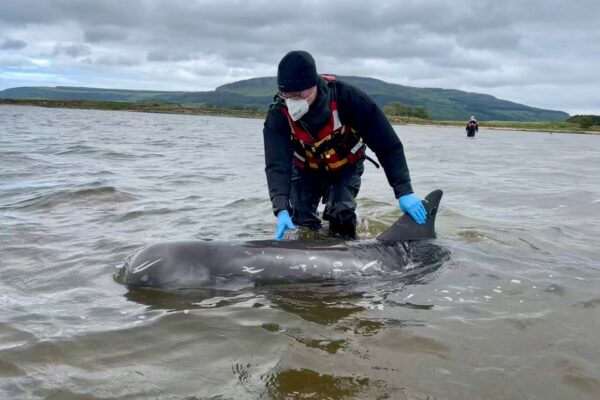 Environment officers spent around half an hour trying to re-float two dolphins that had been beached on the north coast during a dramatic rescue on Monday evening.
Environment officers spent around half an hour trying to re-float two dolphins that had been beached on the north coast during a dramatic rescue on Monday evening.
The dolphins, which had been stranded at Balls Point beach in Co Derry, were discovered by a mother and her daughter who were out for a walk at the time.
They initially informed animal charity Dog Leap, who contacted the British Divers Marine Life Rescue (BDMLR) and the Department for Agriculture, Environment and Rural Affairs (DAERA).
A Department spokesperson said the rescue operation had been complex, but ultimately successful.
“DAERA’s Marine Conservation team responded to calls from the public about live stranded dolphins near Balls Point, Lough Foyle on Monday June 17,” they said.
“On arrival, two adult Risso’s dolphins were found alive but stranded on the foreshore.
“Risso’s dolphins are rarely encountered in Northern Ireland waters, as their preferred habitats are deeper, offshore waters.
“Several members of the public kept the dolphins cool with seawater after alerting British Divers Marine Life Rescue (BDMLR) and DAERA of the incident.
“DAERA’s officers assessed the breathing rates and condition of the dolphins to determine which animal was the most suitable candidate for re-floating.
“The younger dolphin had a more normal breathing rate and a healthier body weight and so a tarpaulin was used to support it and move it into deeper water first.”
Officials had to wade out into the lough for several hundred metres in order to successfully release the younger dolphin.
“Given how expansive the shallow part of the lough was at this location, officers had to wade out for several hundred metres to access a sufficient depth of water to release the animal safely,” they said.
“Initially, the re-floated dolphin was largely immobile having lost much of its dexterity due to muscle stiffening when stranded ashore .
“The dolphin was supported in the water for almost 30 minutes and righted several times when it listed onto its side, causing its blowhole to become submerged.
“Eventually it began sweeping its tail and swimming slowly forward, occasionally in circles and needing to be redirected.
“With the assistance of the incoming tide, an attempt was then made to rescue the older, thinner dolphin. This animal was noticeably underweight and heavily scarred after years of interacting with other dolphins and feeding on squid.
 “To everyone’s surprise, it recovered faster than the younger dolphin and quickly joined the first animal. Both dolphins were then monitored as they swam together nearly a kilometre offshore toward deeper water.”
“To everyone’s surprise, it recovered faster than the younger dolphin and quickly joined the first animal. Both dolphins were then monitored as they swam together nearly a kilometre offshore toward deeper water.”
Beaching of whales and dolphins has previously occurred on Lough Foyle, and the Department said they would continue to monitor the area for further incidents.
“Sadly, only a minority of live stranded whales, dolphins or porpoises are successfully re-floated as many animals have unseen, underlying health issues and so DAERA and BDMLR will monitor the area for any further re-stranding of the dolphins,” said a spokesperson.
“Our thanks to the members of the public who reported the sightings and the stayed with them.
“Live stranded whales, dolphins or porpoises should be reported to British Divers Marine Life Rescue (BDMLR) on 01825 765546 as they are the lead organisation responsible for assessing and rescuing these marine mammals.
“BDMLR with Irish Whale and Dolphin Group are currently funded by a DAERA Environment Fund grant to facilitate this work.”
Tags:




